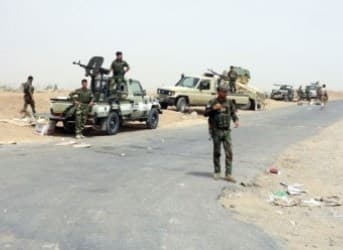The slaughterhouse that Iraq has become in the past week is the stuff that nightmares are made of. And this is just the beginning.
The threat emanating from the group calling itself the Islamic State of Iraq and the Levant is so serious to the stability of the region -- and beyond – that even Iran said it would not oppose U.S. military intervention if it were aimed at the Islamists who have embarked on a rampage of murder and looting across Iraq.
The stunning and unexpected victories by the Islamists are very worrisome. In a region that is no stranger to conflict, this one is particularly frightening and has far-reaching consequences, including the threat of spin-off groups similar to ISIS taking root in surrounding nations.
A militarily successful Islamist force straddling over parts of Iraq and Syria will pose a real threat to the security and stability of those countries’ immediate neighbors. Even Syria, where government forces are fighting their own civil war, has offered to send troops to Iraq.
Turkey, Jordan, Lebanon, and, of course, Israel, would be the first to feel the effect of a takfiri victory. But so would Saudi Arabia, Kuwait, Bahrain, Qatar, the UAE, Oman and Yemen. If ISIS is successful in Iraq, there is little reason to believe they would stop
Left unchecked, the Islamists could eventually threaten the stability of countries in Central Asia.
Here’s why the threat goes beyond Iraq and Syria.
In English-language news reports, there are at least two ways in which the group is referred to: Islamic State of Iraq and Syria, or ISIS, and the Islamic State of Iraq and the Levant, or ISIL.
In Arabic, of course, neither words – “Syria” or “Levant” -- are used; instead, the word “Sham” is used. The closest translation of that into English is “Greater Syria.”
Many in the West are fooled by the use of the word “Syria,” and may fail to see the real dimensions of the threat because they think of Syria in the modern geographic sense. But that word, in Arabic, is “Souriya.”
Related Article: Oil-Rich Kurdistan Capitalizes On Iraqi Chaos
Most Middle Easterners, when they hear, “Sham,” or “As-Sham,” know it refers to Greater Syria.
What’s the difference?
Modern Syria is bordered by Turkey to the north, Iraq to the east, Jordan and Israel to the south and Lebanon to the west.
“Greater Syria” incorporates most of the territories of each.
“This is what "Syria" means in the mind of Middle Easterners, says Joshua Landis, director of the Center for Middle East Studies at the University of Oklahoma, and author of the respected blog SyriaComment.com.
“If we can teach people that so many Arabs still think of Syria as Greater Syria, they will begin to understand the extent to which Sykes-Picot remains challenged in the region,” said Landis.
Sykes-Picot, of course refers to the secret agreement drawn up by two British and French diplomats -- Sir Mark Sykes and Francois George-Picot -- at the end of Word War I dividing the spoils of the Ottoman Empires between Britain and France by drawing straight lines in the sand.
To this day, many Arabs refuse to accept that division and think of “Syria” as “Greater Syria.” Some go so far as to include the Arab countries of North Africa – which from the Nile to the Euphrates forms ‘the Fertile Crescent,” the symbol of many Muslim countries from Tunisia to Turkey. And some even go as far as including the island of Cyprus, saying it represents the star next to the crescent.
Given that, anyone who thinks ISIS will stop with Iraq is delusional.
By Claude Salhani of Oilprice.com


















Since that fateful agreement, that 'line in the sand', there has been no peace anywhere in the middle east due to the meddleing of the French. Will they ever learn?